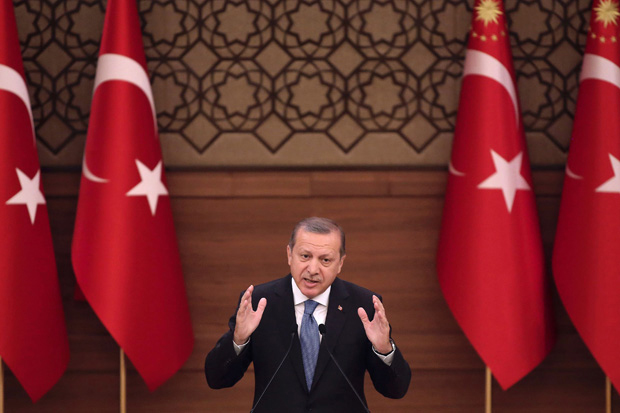At the end of last month, a German comedian appeared on German television and read a poem mocking Recep Tayyip Erdogan, the president of Turkey. Jan Böhmermann’s satire was directed, among other things, at the laws President Erdogan has been using to lock up his critics. Turkey — which David Cameron is still fighting to bring into the EU — now has some of the world’s most repressive speech laws. Numerous journalists have been arrested for ‘insulting’ President Erdogan and he has even been known to ban Twitter in the country when corruption allegations against him and his family have surfaced online.
Yet until Mr Böhmermann came on the scene, one might have expected these lèse-majesté laws to remain in Turkey. Not so. After the late-night comedy show in Germany, the Turkish government complained. Then the show disappeared. Then Mr Böhmermann disappeared under police protection. Then the prosecution began. Yes — in Germany in 2016, a comedian is now going to be tried for being rude about a foreign despot.
It is said that the German cabinet is split on the matter, with Chancellor Merkel trying to spin her own support for a trial by saying that the comedian could yet be found ‘not guilty’. Well hurrah for German justice!
As the assassin’s veto has taken hold in Europe in recent years, one of the strangest things is the way in which we now talk about free speech as if it were an abstract concept. We have endless sub-academic discussions about ‘the limits of free speech’. But free speech isn’t something you talk about. It’s something you do.
In honour of Germany’s missing comedian, I spent last weekend composing foul-mouthed poems about Mr Erdogan. After a happy 48 hours I had come up with a pretty good limerick which foully smeared not only President Erdogan but also his German counterpart for being his handmaiden. This latter point, I might add, is not expressed delicately in my work. Then on Monday, via The Spectator’s website, I launched the ‘President Erdogan Insulting Poetry Competition’, humbly presenting my own work and encouraging readers to do better (or worse). There are some strict rules. Although limericks are preferred (what insult cannot be included in that delicate and beautiful form?) this is not to say that long-form entries in iambic pentameter or heroic couplets will be entirely discounted. But it is well to keep these things within manageable limits. I have also stressed that all entries must be (a) wholly defamatory and (b) utterly obscene. Any that are not will be disqualified automatically.
Well, the entries immediately started flooding in, despite the fact that I had stressed that there was no prize other than our continuing freedoms. The following morning a reader got in touch and kindly offered a £1,000 prize. So we are away! The flood has become a deluge. Poems are pouring in from around the world (including Erdogan’s own country). Some debated the size of his manhood, others mulled on his sexual practices, others suggested (as Böhmermann had done) that his relations with the animal kingdom are not so innocent as they might seem. Although the competition is open to all, I would favour a German or Turkish entrant. Entries should be sent to theeditor@spectator.co.uk, under the heading ‘The President Erdogan Offensive Poetry Competition’. I have set a deadline of 23 June, as we may not be allowed to announce the winner after that date.
I can already draw some conclusions. One is that although people’s minds are gratifyingly filthy, their technical abilities often lag far behind. Too many people today fail to understand poetic scansion. Others struggle to realise that a rhyme should never seem forced. Some even put in words that do not really exist. One commonplace effort seeks to rhyme the Turkish capital of Ankara with a word which, though unarguably helpful in the context, is not quite in the dictionary.
But the prize is already attracting great talent. So it should, for it is perhaps per line now the highest-paid poetry prize anywhere in the world. Indeed, if the winner has taken my advice and written a limerick it will probably make him or her (at £200 a line) the world’s best-paid poet. It is far better pay than the Laureateship (which I hope will persuade Carol Ann Duffy to enter).
At the time of writing, our competition has been discussed in the world’s greatest media outlets, from the USA to India. And of course it has been noticed in Turkey. A satisfyingly large number of journalists have reflected that what can get you imprisoned in Germany may now earn you £1,000 from a British magazine. It is a happy stand against an unhappy trend. But it has already grown too big for me. And although I am tempted, vizier-like, to declare myself the winner and snaffle the cash, in the days ahead I am going to have to put together the prize jury. Is there any panel that could be more fun to sit on?
Got something to add? Join the discussion and comment below.
Get 10 issues for just $10
Subscribe to The Spectator Australia today for the next 10 magazine issues, plus full online access, for just $10.
You might disagree with half of it, but you’ll enjoy reading all of it. Try your first month for free, then just $2 a week for the remainder of your first year.














